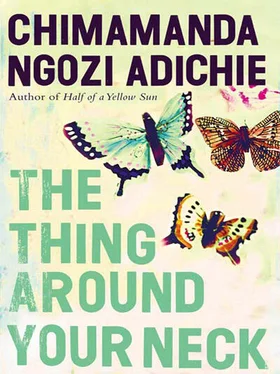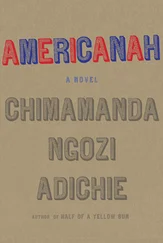Your mother started to scream. And you wondered if people screamed in that crazed way when they had just chosen to reject truth. She knew well enough that Nonso had hit his head on a stone and died on the spot — she had seen his body, his cracked head. But she chose to believe Nonso was alive after he fell. She cried, howled, and cursed the day she set eyes on your father at the first exhibition of his work. Then she called him, you heard her shouting on the phone: Your mother is responsible! She panicked him and made him fall! She could have done something afterwards but instead she stood there like the stupid fetish African woman that she is and let him die!
Your father talked to you afterwards, and said he understood how hard it was for you but you had to be careful what you said so that you didn’t cause more hurt. And you thought about his words — Be careful what you say — and wondered if he knew you were lying.
That summer, eighteen years ago, was the summer of your first self-realization. The summer you knew that something had to happen to Nonso, so that you could survive. Even at ten you knew that some people can take up too much space by simply being, that by existing, some people can stifle others. The idea of scaring Nonso with the echi eteka was yours alone. But you explained it to Dozie, that you both needed Nonso to get hurt — maybe maim him, maybe twist his legs. You wanted to mar the perfection of his lithe body, to make him less lovable, less able to do all that he did. Less able to take up your space. Dozie said nothing and instead drew a picture of you with your eyes in the shape of stars.
Grandmama was inside cooking and Dozie was standing silently close to you, your shoulders touching, when you suggested Nonso climb to the top of the avocado tree. It was easy to get him to; you only had to remind him that you were the better climber. And you really were the better climber, you could scale a tree, any tree, in seconds — you were better at the things that did not need to be taught, the things that Grand mama could not teach him. You asked him to go first, to see if he could get to the topmost branch of the avocado before you followed. The branches were weak, and Nonso was heavier than you. Heavy from all the food Grandmama made him eat. Eat a little more, she would say often. Who do you think I made it for? As though you were not there. Sometimes she would pat your back and say in Igbo, It’s good you are learning, nne, this is how you will take care of your husband one day.
Nonso climbed the tree. Higher and higher. You waited till he was nearly at the top, till his legs hesitated before inching farther up. You waited for that short moment when he was between motions. An open moment, a moment you saw the blueness of everything, of life itself — the pure azure of one of your father’s paintings, of opportunity, of a sky washed clean by a morning shower. Then you screamed. “A snake! It’s the echi eteka ! A snake!” You were not sure whether to say that the snake was on a branch close to him, or sliding up the trunk. But it didn’t matter because, in those few seconds, Nonso looked down at you and let go, his foot slipping, his arms freeing themselves. Or maybe the tree simply shrugged Nonso off.
You don’t remember now how long you stayed looking at Nonso before you went in to call Grandmama, Dozie all the time silent beside you.
Dozie’s word—“hate”—floats around in your head now. Hate. Hate. Hate. The word makes it difficult to breathe, the same way it was difficult to breathe when you waited, those months after Nonso died, for your mother to notice that you had a voice pure like water and legs like elastic bands, for your mother to end her good-night visits to your room with that deep ho - ho - ho laugh. Instead she held you too gingerly while saying good night, always speaking in whispers, and you started to avoid her kisses by faking coughs and sneezes. Year after year as she moved you from state to state, lighting red candles in her bedroom, banning all talk of Nigeria or of Grandmama, refusing to let you see your father, she never again laughed that laugh.
Dozie speaks now, tells you that he began to dream of Nonso a few years ago, dreams in which Nonso is older and taller than him, and you hear fruit fall from a tree nearby and you ask him without turning around, What did you want, that summer, what did you want?
You do not know when Dozie moves, when he stands behind you, so close that you smell the citrus on him, perhaps he peeled an orange and did not wash his hands afterwards. He turns you around and looks at you and you look at him and there are fine lines on his forehead and a new harshness in his eyes. He tells you it did not occur to him to want because what mattered was what you wanted. There is a long silence while you watch the column of black ants making its way up the trunk, each ant carrying a bit of white fluff, creating a black-and-white pattern. He asks you if you dreamed the way he did and you say no, your eyes avoiding his, and he turns away from you. You want to tell him about the pain in your chest and the emptiness in your ears and the roiling air after his phone call, about the doors flung open, about the flattened things that popped out, but he is walking away. And you are weeping, standing alone under the avocado tree.
Many years after her husband died, Nwamgba still closed her eyes from time to time to relive his nightly visits to her hut and the mornings after, when she would walk to the stream humming a song, thinking of the smoky scent of him, the firmness of his weight, those secrets she shared with herself, and feeling as if she were surrounded by light. Other memories of Obierika remained clear — his stubby fingers curled around his flute when he played in the evenings, his delight when she set down his bowls of food, his sweaty back when he returned with baskets filled with fresh clay for her pottery. From the moment she first saw him at a wrestling match, both of them staring and staring at each other, both of them too young, her waist not yet wearing the menstruation cloth, she had believed with a quiet stubbornness that her chi and his chi had destined their marriage, and so when he came to her father a few years later bringing pots of palm wine and accompanied by his relatives, she told her mother that this was the man she would marry. Her mother was aghast. Did Nwambga not know that Obierika was an only child, that his late father had been an only child whose wives had lost pregnancies and buried babies? Perhaps somebody in their family had committed the taboo of selling a girl into slavery and the earth god Ani was visiting misfortune on them. Nwamgba ignored her mother. She went into her father’s obi and told him she would run away from any other man’s house if she was not allowed to marry Obierika. Her father found her exhausting, this sharp-tongued, headstrong daughter who had once wrestled her brother to the ground. (After which her father had warned everybody not to let the news leave the compound that the girl had thrown a boy.) He, too, was concerned about the infertility in Obierika’s family, but it was not a bad family: Obierika’s late father had taken the ozo title; Obierika was already giving out his seed yams to sharecroppers. Nwamgba would not do badly if she married him. Besides, it was better that he let her go with the man she chose, to save himself years of trouble when she would keep returning home after confrontations with in-laws. And so he gave his blessing and she smiled and called him by his praise name.
To pay her bride price, Obierika came with two maternal cousins, Okafo and Okoye, who were like brothers to him. Nwamgba loathed them at first sight. She saw a grasping envy in their eyes that afternoon as they drank palm wine in her father’s obi, and in the following years, years in which Obierika took titles and widened his compound and sold his yams to strangers from afar, she saw their envy blacken. But she tolerated them, because they mattered to Obierika, because he pretended not to notice that they didn’t work but came to him for yams and chickens, because he wanted to imagine that he had brothers. It was they who urged him, after her third miscarriage, to marry another wife. Obierika told them he would give it some thought but when he and Nwamgba were alone in her hut at night, he told her that he was sure they would have a home full of children, and that he would not marry another wife until they were old, so that they would have somebody to care for them. She thought this strange of him, a prosperous man with only one wife, and she worried more than he did about their childlessness, about the songs that people sang, melodious mean-spirited words: She has sold her womb. She has eaten his penis. He plays his flute and hands over his wealth to her .
Читать дальше











